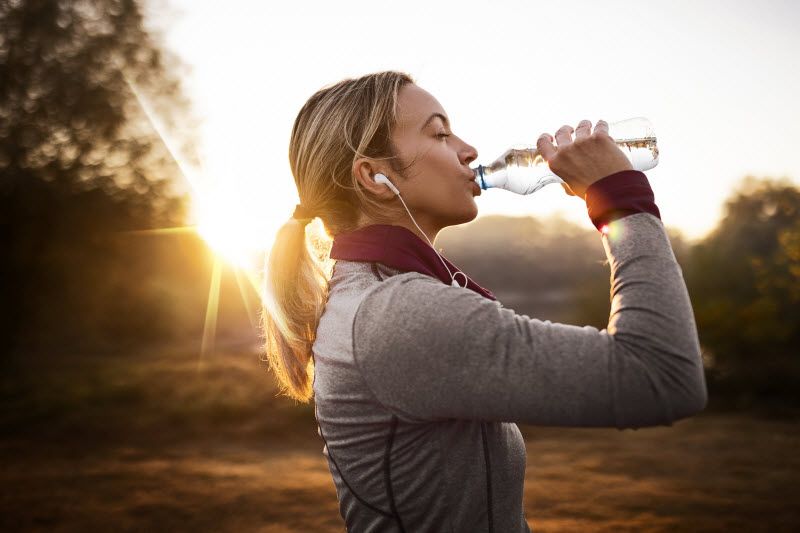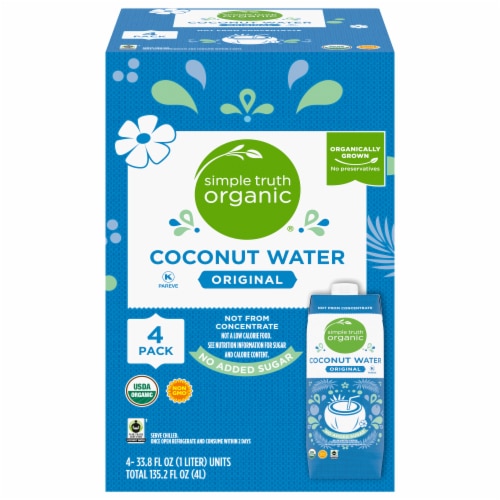[vc_row][vc_column][vc_column_text]Suddenly, it appears that
microplastics are everywhere in our diet. Recent studies have found these particles lurking in everything from meat, seafood and tofu to plant-based foods and food additives.
Now, research has found microplastics and even smaller nanoplastics hiding in bottled water.

A recent study reported the scary fact that nanoparticles no larger than 1,000
th the width of a human hair may be present in bottled water at levels that are 100 times what has been previously estimated.
Researchers at Columbia University say these plastic bits are so small that they can travel through the digestive tract or lungs, find their way into the body’s bloodstream and enter the body’s cells.
The researchers report that 1 liter of water contains an average of 240,000 plastic particles. Of these, 90% were nanoplastics and the remaining 10% were microplastics.
What are the potential dangers of microplastics?
Recent studies have found that
microplastics are prevalent in the human body. Particles have been detected in people's blood, lungs and breast milk. Microplastics also appear in maternal and fetal placental tissues.
No one should be surprised at the widespread presence of these particles. Plastics are a part of modern life, showing up in everything from the clothes we wear to the packages we receive after ordering items online.
When these plastics break down, they can turn into microplastics or nanoplastics. The latter particles are even smaller than microplastics, and are less than 1 micrometer in length.
How harmful are microplastics and nanoplastics? No one can say for sure. Some experts say there is little evidence that microplastics pose a danger to humans, at least in the amounts that are commonly present in the environment.
The World Health Organization has emphasized that research into the health impact of microplastics has found little evidence to support claims that the particles – including the nano-sized particles in drinking water – might harm human health.
According to WHO: “Humans have ingested microplastics and other particles in the environment for decades with no related indication of adverse health effects. In addition, drinking-water
treatment is effective at removing particles.”
The European Commission’s Science Advice for Policy organ – SAPEA – has stated that there is not enough research to conclusively rule out the possibility that microplastics might harm human health.
Nonetheless, the organization has also said that the most reliable research to date “suggests that
microplastics and nanoplastics do not pose widespread risk to humans and the environment.”
However, not everyone sees microplastics as harmless. And a growing number of researchers are sounding the alarm about the potential dangers they might pose.
These experts worry that the particles might damage the lungs. Other experts believe the chemicals found in some particles interfere with the body's hormones.
Ways to avoid microplastics in your water
Despite such concerns, it is worth emphasizing again that no one knows for sure whether microplastics pose a serious health concern to people.
Toby Amidor, a registered dietitian and author of "Up Your Veggies: Flexitarian Recipes for the Whole Family," acknowledges the presence of microplastics in the food supply, noting that the particles have been found in human blood, lungs, gut, feces and reproductive tissues.
She adds that because microplastics "are everywhere," they do indeed appear in foods and drinks. But she says it can be counterproductive to jump to conclusions about health dangers that these particles might pose.
"The health effects of these microplastics are unproven and unknown at this time," she says. "So, you cannot make any conclusions."
Amidor believes some research has crossed the line from raising concerns about microplastics to promoting "fear mongering," which can send the wrong signal to consumers. "We need to eat and drink to live," she says.
How to reduce exposure to microplastics in drinking water
Still, if you are concerned about microplastics in your drinking water, Amidor says there are alternatives to ingesting water from plastic bottles.
“As there is no clear evidence at this time, it is a personal choice if someone does not want to drink from plastic containers, or wants to lessen the amount of water consumed in this manner,” she says.
If you have concerns about microplastics in your drinking water, you could look for drinking water sold in boxes or other containers that do not feature plastic.
“You can also use a refillable water bottle for water, which also helps decrease purchasing plastic and can be cheaper over time,” Amidor says.
She says there are many good options when choosing a reusable water bottle.
"One of my go-to brands is Klean Kanteen, which is Climate Neutral Certified, BPA- and lead-free, Amidor says.
She adds that such water bottles also are made from 90% recycled stainless steel, are chip-resistant, have a removable spout and are dishwasher-safe.
"These are all good characteristics to look for in a well-made reusable water bottle," she says.
Another simple solution to reducing your exposure to microplastics might be to simply boil tap water.
Microplastics have been found in tap water, but boiling that water might destroy nearly 90% of such particles, according to a study recently published in the journal Environmental Science and Technology Letter.
Researchers say boiling water for five minutes and leaving it to cool dramatically reduces the presence of microplastics. They note that in harder water, calcium carbonate becomes solid when boiled, which traps plastic particles.
Pouring this water through a coffee filter traps the solidified calcium, leaving the water largely free of microplastics.[/vc_column_text][/vc_column][/vc_row][vc_row][vc_column][vc_text_separator title="Featured Products" border_width="2"][vc_row_inner equal_height="yes" content_placement="middle" gap="35"][vc_column_inner width="1/3"][vc_single_image image="173573" img_size="full" alignment="center" onclick="custom_link" img_link_target="_blank" css=".vc_custom_1710283125485{padding-right: 7% !important;padding-left: 7% !important;}" link="https://www.vitacost.com/c2o-non-gmo-pure-coconut-water-original"][/vc_column_inner][vc_column_inner width="1/3"][vc_single_image image="173572" img_size="full" alignment="center" onclick="custom_link" img_link_target="_blank" css=".vc_custom_1710283141631{padding-right: 7% !important;padding-left: 7% !important;}" link="https://www.vitacost.com/new-wave-enviro-barrier-water-twist-filter-pitcher-blue#recipes"][/vc_column_inner][vc_column_inner width="1/3"][vc_single_image image="173574" img_size="full" alignment="center" onclick="custom_link" img_link_target="_blank" css=".vc_custom_1710283157467{padding-right: 7% !important;padding-left: 7% !important;}" link="https://www.vitacost.com/simple-truth-organic-coconut-water-original-33-8-fl-oz-each-pack-of-4"][/vc_column_inner][/vc_row_inner][/vc_column][/vc_row]
 A recent study reported the scary fact that nanoparticles no larger than 1,000th the width of a human hair may be present in bottled water at levels that are 100 times what has been previously estimated.
Researchers at Columbia University say these plastic bits are so small that they can travel through the digestive tract or lungs, find their way into the body’s bloodstream and enter the body’s cells.
The researchers report that 1 liter of water contains an average of 240,000 plastic particles. Of these, 90% were nanoplastics and the remaining 10% were microplastics.
A recent study reported the scary fact that nanoparticles no larger than 1,000th the width of a human hair may be present in bottled water at levels that are 100 times what has been previously estimated.
Researchers at Columbia University say these plastic bits are so small that they can travel through the digestive tract or lungs, find their way into the body’s bloodstream and enter the body’s cells.
The researchers report that 1 liter of water contains an average of 240,000 plastic particles. Of these, 90% were nanoplastics and the remaining 10% were microplastics.



